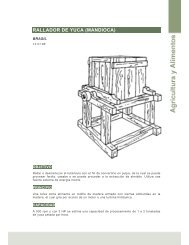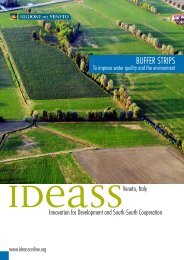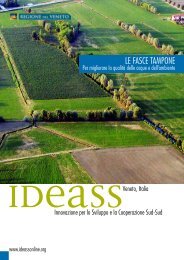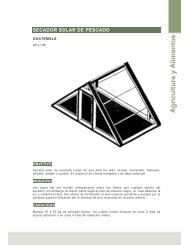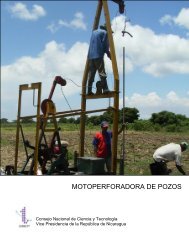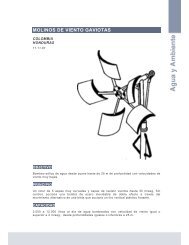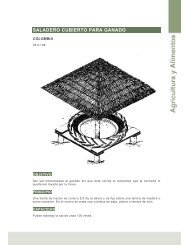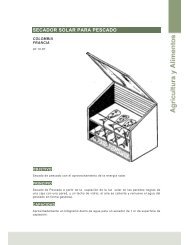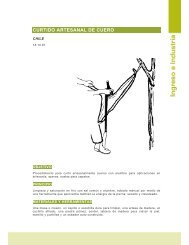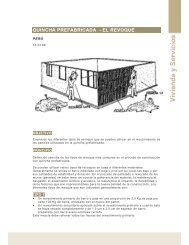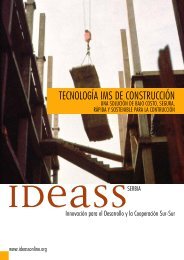From Philippines to Nepal - Ideassonline.org
From Philippines to Nepal - Ideassonline.org
From Philippines to Nepal - Ideassonline.org
You also want an ePaper? Increase the reach of your titles
YUMPU automatically turns print PDFs into web optimized ePapers that Google loves.
Transferring women’s know how on bamboo craft<strong>From</strong> <strong>Philippines</strong> <strong>to</strong> <strong>Nepal</strong>June 2011In many years of working with bamboo materials <strong>to</strong> produce novelty, giftand houseware items of export quality right at her village in Lagangilang,Abra Province of <strong>Philippines</strong>, it never dawned on Memorada BersalonaAberion, “Moring” for her friends and owner of Aberion BamboocraftEnterprise, that her delicately woven bamboo trays and baskets wouldattract attention from overseas buyers and producers of bamboo products.Somehow, the information about her bamboo products reached farawayplaces like <strong>Nepal</strong>.by Benjamin MilanoDEVNET Centre for Asia-Africa Direc<strong>to</strong>rIn the <strong>Philippines</strong> Province of Abra, bamboo-based enterprises constitutea primary industry. The estimated production volume is 220,000 linearmeters, from various species such as tinik, kawayan, poser, bayog, buboand bical. So remarkable is the growth of the bamboo industry in theProvince that each village has created distinct weaving patterns of its own when it comes <strong>to</strong> the use ofbamboo. Domestic sales of bamboo products come <strong>to</strong> about Pesos 17.9 million a year. In terms of export, theprovince averages USD 700,000 sales a year. This directly benefits about 1, 700 people in different <strong>to</strong>wnsand barangays, which are all dependent on the bamboo industry. The <strong>to</strong>wn of Lagangilang, where AberionBamboocraft Enterprise is situated, is a community known for excellent and export quality bamboo products.The bamboocraft business of Moring remains small but it is going big in terms of reaching <strong>to</strong> new markets.Together with other bamboocraft producers in her <strong>to</strong>wn, this opportunity is not just within reach but already intheir grasp.The women producers in the remotemountain region of <strong>Nepal</strong> have beencoming up with a variety of traditionalsouvenir products for <strong>to</strong>urists spendingholidays in the high elevations of <strong>Nepal</strong>.Little did they know that the abundantlygrowingbamboo in their mountains couldbe used <strong>to</strong> produce finely-woven bambooproducts such as hats, houseware items,nested trays and bags that fetchhandsome prices in the export market.When they were introduced <strong>to</strong> women inthe Cordillera Mountains of the<strong>Philippines</strong>, they learned of newpossibilities <strong>to</strong> make more products ofthe perennial bamboo. It <strong>to</strong>ok the participation of a group of <strong>Nepal</strong>ese women in a Manila trade fair <strong>to</strong> get the
two women groups, which are worlds apart, <strong>to</strong> share experience with each other on the art and business ofbamboo weaving.The <strong>Nepal</strong>ese women indicated the need <strong>to</strong> acquire technical skills as well as experience in developingbusiness on bamboocraft. They showed interest in the <strong>Philippines</strong> as source of technology and businessexperience. Aberion Bamboocraft Enterprise, one of the enterprises that the WINNER Project supports ingaining access <strong>to</strong> markets, came out as the best choice for technology transfer consultancy <strong>to</strong> serve theneeds of the <strong>Nepal</strong>ese women.Several weeks after, the coordina<strong>to</strong>r of theWEAN - Women Entrepreneurs Association of<strong>Nepal</strong> announced that two of its members wouldcome <strong>to</strong> Manila <strong>to</strong> meet with AberionBamboocraft Enterprise, <strong>to</strong> open discussions onthe terms of engagement. The meeting washosted by the WINNER office in Manila. Duringthe meetings, the main areas of interest werediscussed and terms of engagement for a trainingconsultancy were defined. Later, a contract wassigned between the two <strong>org</strong>anizations.Overwhelmed by the prospects of working for onemonth in a remote village up on the slopes of theHimalayas <strong>to</strong> train 28 women from thecommunities, Moring, with the support of theWINNER office, agreed <strong>to</strong> take on this first-everconsultancy work. More than the technical aspects of bamboo processing and weaving, Moring brought <strong>to</strong>Dhankuta, in <strong>Nepal</strong>, her business experience with the view <strong>to</strong> share with the trainee’s insights on dealing withbuyers from abroad and promoting the new products through trade fairs. "Exposure is important in order thatpeople will know what you have. Before they make an order, even for a few pieces, the buyers have <strong>to</strong> seethe products, talk <strong>to</strong> the producer and make some suggestions," Moring explained. "I have participated intrade fairs right at the community as well as in Manila, with the assistance of relevant government agenciesand non-government <strong>org</strong>anizations and I know the importance of getting the right exposure <strong>to</strong> market.Skill in bamboo weaving, abundant bamboo materials, available labour in the communities are some of thecompetitive fac<strong>to</strong>rs that help her bamboocraft business thriving through the years. Job orders from buyers inBaguio City and Manila come in volume, thus necessarily there's need <strong>to</strong> <strong>org</strong>anize the production system <strong>to</strong>meet the product quantity and quality. In such situation, the people in her community are mobilized <strong>to</strong> engagein various stages of the production process. She divides the work by assigning some work <strong>to</strong> residents in hercommunity while she and her husband would take care of the finishing and quality control. At times, thebuyers would require a special type of bamboo weaving, thus insuch case she would train the weavers. Training the new workerson the techniques and use of special hand <strong>to</strong>ols takes time. "I had10 workers when I and my husband started the business in 1978.Now, we have about 50 workers, each of them earns minimum ofPesos 200 per day," she recounted. Moring's husband, FelixAberion, teaches the workers on how <strong>to</strong> do bamboo weaving. He isan expert and meticulous about quality and consistency of finishedbamboo products. As former trainer, Felix shares his skill inbamboo weaving, which he has polished when he taught at theHoly Cross School in Abra.The training of <strong>Nepal</strong>ese women was focused on the processing of the strips of bamboo for weaving variousnovelty products. With the use of hand <strong>to</strong>ols that Moring and her husband fabricated, the work becamesimpler, thus learning the technique went smoothly for the trainees. "I also noticed that the type of bambooavailable in <strong>Nepal</strong> is suited for furniture, so I also showed the trainees how <strong>to</strong> put <strong>to</strong>gether the materials <strong>to</strong>produce bamboo furniture without the use of nails".


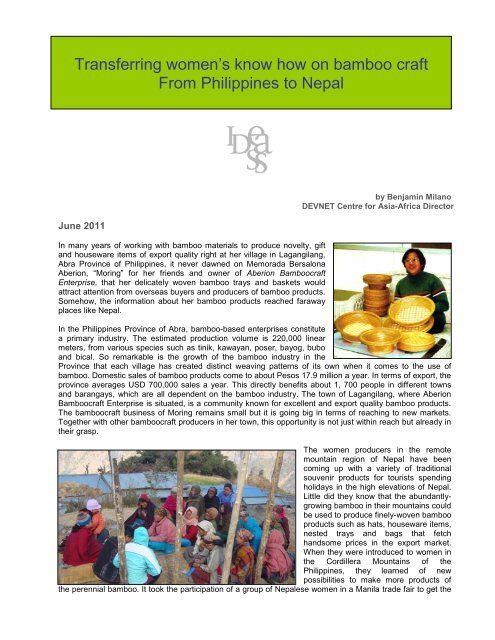
![[M077] Molino de viento cretense-instalación - Ideassonline.org](https://img.yumpu.com/51119608/1/190x245/m077-molino-de-viento-cretense-instalacian-ideassonlineorg.jpg?quality=85)
![[E004] Secador solar para madera (Guatemala ) - Ideassonline.org](https://img.yumpu.com/50176079/1/190x245/e004-secador-solar-para-madera-guatemala-ideassonlineorg.jpg?quality=85)
